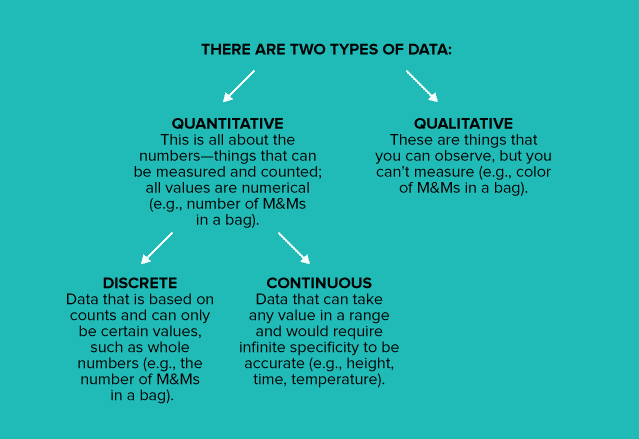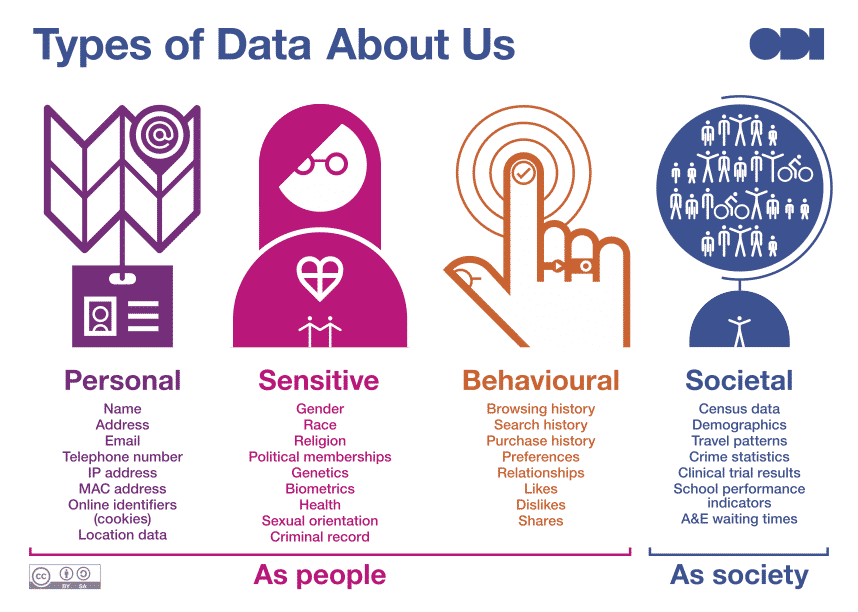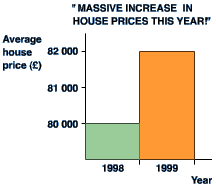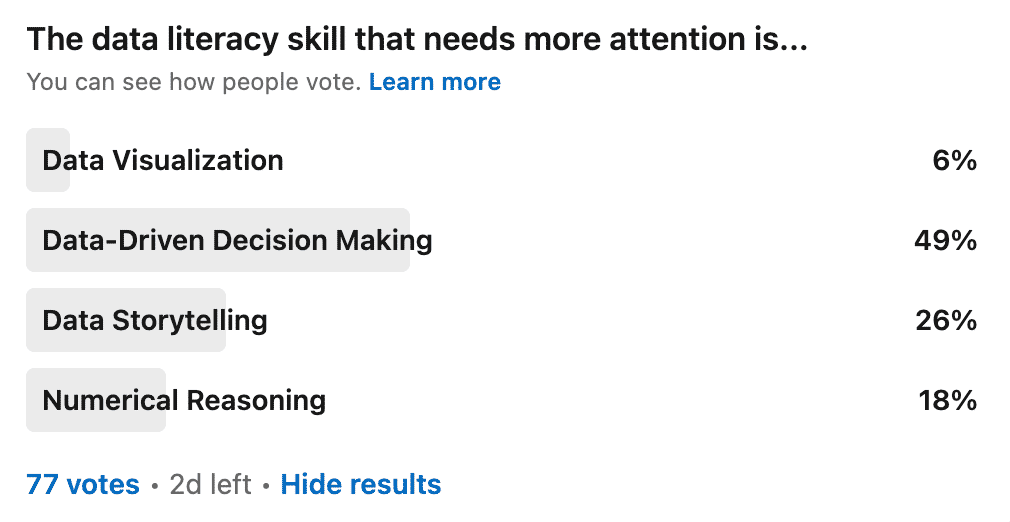Data literacy skills are increasingly top-of-mind for corporate learning and development initiatives. A recent webinar guest, Daryl D’Cruz, shared, “data literacy skills are the building blocks of digital transformation.”
Who needs Data Literacy Skills?
The definitions of “data literacy” vary. At QuantHub, we know that the level of data skills needed in some roles is greater than others. However, regardless of job title, function, or industry, we believe everyone should be a Data Citizen. A Data Citizen is simply someone who can make better decisions and have more informed opinions because of the 10 essential data literacy skills outlined in this article.
On LinkedIn, we asked what data literacy skill needs more attention and the results were interesting as well as the comments the poll generated. The poll reinforced our holistic approach to data literacy.
1. Understanding what data is and how it is measured
This skill is the foundational understanding of what data is, how it is described, and what it can describe. If we equate data literacy to language literacy. This skill is like learning to say and understand basic, necessary words in a language before stringing grammatically correct, complex sentences together.
How would this data skill help a data citizen in the real world? One way is by interpreting data types. See the chart below for a breakdown of data types.

Source: Visage, Data 101
Understanding the various types of data allows an individual to make better decisions about what data they’re collecting and/or creating.
2. Understanding how to identify data sources in work and everyday life
Now that we understand what data is, we can identify where it comes from. Data can be open source, something you have access to (ie. company database), or it can be generated through your work. This data literacy skill is crucial to understanding how we’re knowingly and unknowingly generating data that directly impacts our lives.
Source: The Open Data Institute
It might make you feel a bit squirmy, but we (humans) are sources of data. Where we live, what we do, and our demographics are just a few pieces of data that gets attributed to us. Data stewardship is a more advanced data skill as it relates to corporate data, but as individuals we should all be aware of the data we create and take a stewardship approach of that personal information.
The quantified-self movement is a good example of how we allow data to be collected for our own wellbeing, but of course awareness of the downstream implications of that data is also important to understand as a Data Citizen.
3. Interpreting data visualizations
Everyone can read a chart, right? Wrong! A critical skill to interpret the data in our everyday lives is to know how to interpret data visualizations,
and understand ifthey are deceiving. A good chart is communicating multiple pieces of information at a time, and a Data Citizen is able to glean the full story of a data visualization, not just certain data points.
For example, you might think a s catterplot is a simple data visualization, but this helpful guide from our friends at Juice analytics show how there are more layers than you might think!
catterplot is a simple data visualization, but this helpful guide from our friends at Juice analytics show how there are more layers than you might think!
4. Determining common data applications
As an individual builds their understanding of data, the next skill is to explore different use cases for data. A Data Citizen begins to recognize data applications across different industries and job functions.
This is a key data literacy skill because it brings some of the definitions and categorizations of data down to earth with real-world implications. In the video below, Bernard Marr shares the 25 biggest technology trends for 2020-2030. Most of these trends come back to data and serve as case studies for how data is being used to leverage AI, machine learning, and more.
5. Identifying and promoting the ethical treatment of my data and data that I use
A Data Citizen understands the ethical implications of gathering, using, sharing, and managing data. At QuantHub, we think a foundational aspect of data literacy is training individuals to be ethical consumers of data and to also have a good understanding of their rights in the use of their data.
It’s easy to think of data skills as “offense;” how to use data to accomplish better business outcomes. But, Data Citizens also use data skills to play “defense.” The ethics of data are critical to understand in the onset of a learners journey because the stakes only get higher are AI and ML is introduced.
6. Creating value with data
All of the data generated doesn’t mean anything unless we turn it into actionable insights that create value. A Data Citizen realizes the potential for data even if they can’t achieve it without help.
With the understanding that data is an asset, a Data Citizen can ask informed questions about the data. This essential skill is about the ability to zoom out and see the bigger picture. It is the intersection where data awareness and understanding meets critical thinking.
7. Interpreting and evaluating common metrics and statistics that people, or companies, use to support their arguments
This skill goes one step deeper on the idea of data literacy as language literacy. To be able to speak the language of data, understanding mathematical concepts is necessary. Data citizens have a good grasp on common concepts like mean, variables, correlation, percentages etc.
This data literacy skillset includes basic statistical awareness. For example, a Data Citizen can interpret the measures of central tendency and can create and understand percentages.
8. Evaluating data quality
Data citizens are critical of the data they use in their decision making. They understand not all data is created equal and have a good grasp on the data quality dimensions impacting a particular data set. They have the ability to identify and analyze the following dimensions:
- Timeliness
- Validity
- Consistency
- Completeness
- Accuracy
- Uniqueness
9. Evaluating Bias
A Data Citizen has the tools and framework to look at statistics, data sets, and more with a critical eye. A key component of thinking critically about data is having the ability to evaluate bias.
Data literacy skills are not just skills of “how to do something,” but also, “how to think about something.” This is an important piece of the Data Citizen’s learning journey. At QuantHub, we focus on making sure that learners understand biases in data such as: cognitive bias, analytical bias, AI bias, and more.
10. Making Data-Driven Decisions
At the Data Citizen level of data literacy, making data-driven decisions is the ultimate goal. Equipped with the language of data, an understanding of types of data, and how to think about data, Data Citizens can use their data literacy to make better decisions.
This skill is the final step in our list of 10 essential data literacy skills because it is a culmination of all the previous skills. Skills 1-9 are crucial to helping an individual make decisions with a data-driven lens. At QuantHub we believe getting every employee to this step as a Data Citizen will change the velocity in which companies adapt to change, incorporate new technologies, and realize their full potential.
Build Data Literacy Skills Now
Data skills are not optional in 2021. Becoming data literate and unlocking the capabilities of a “Data Citizen” is not only about professional performance. Data is everywhere. These 10 skills will naturally help individuals make better consumer decisions, privacy decisions, and much more.
Our mission at QuantHub is to be a catalyst for the data fluency of companies and individuals across the world. We want companies to be full of employees who use data for the betterment of themselves and others. That’s why we help individuals of any data skill achieve a baseline of data literacy.
